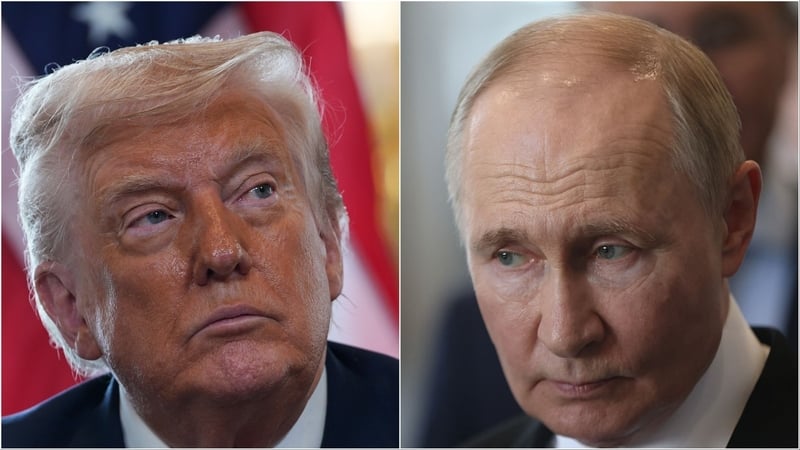First it was 50 days.
But that deadline hardly made the Kremlin blink.
Then, earlier this week, US President Donald Trump gave Russia a new ten-day deadline to end its three-and-half-year war in Ukraine.
It was a simple ultimatum from the US: sign up to a ceasefire agreement by next Friday or face 100% tariffs.
Russia’s trading partners would also face 100% secondary tariffs.
Exports of Russian oil and gas account for about 60% of the country’s overall exports, according to various estimates.
Given that the profits of Russian oil companies are taxed heavily by the Russian state, implementing such high tariffs would deny Russia much-needed revenue for its war in Ukraine.
According to the Centre for Research on Energy and Clean Air, a Helsinki-based thinktank, Russia has made more than €920bn on exports of fossil fuels since the start of its full-scale invasion of Ukraine.
Oil exports accounted for more than €630bn during that time.
The Kremlin ignored Mr Trump’s first 50-day ultimatum and has done the same with the new one, simply saying that the US president’s comments were “noted”.
True to form, Russian President Vladimir Putin has not responded directly to Mr Trump’s latest ultimatum to end the war.

Russia’s missile strikes on Ukrainian cities during this week have also indicated that Mr Trump’s new deadline has not influenced Russia’s war tactics.
On Thursday, Russian strikes killed 31 people in Kyiv, including five children, and on Tuesday, Russian airstrikes on a prison and hospital in the Zaporizhzhia region killed 19 people.
Russian forces are continuing their slow advance along the front, claiming to have captured Chasiv Yar on Thursday.
Chasiv Yar is a strategically important but destroyed town in eastern Ukraine that has been fought over for 16 months.
Ukraine denied that the town had been lost.
If there are any moves inside the Kremlin towards agreeing a ceasefire deal by next Friday, then its leadership is hiding it very well indeed.
During the week, Kremlin spokesperson Dmitry Peskov said Russia had “developed an immunity” to Western sanctions after years of being sanctioned, while other senior officials aired similar views.
Many analysts agree that Russia’s economy has largely weathered more than three years of Western penalties – actions that included sanctions on Russian banks, freezing their assets and excluding them from using the global system for international payments.
The West also set a price cap in late 2022 of $60 per barrel on Russian maritime exports of oil.
However, Russia has continued to export its oil to buyers from non-sanctioning countries through its so-called ‘shadow fleet’.
These are mostly aging tankers with opaque maritime histories, registered in third-party countries to circumvent sanctions.
Read more: Data flags hundreds of Russian ‘shadow fleet’ visits to Irish EEZ
The EU’s latest batch of sanctions last month – the 18th so far – aims to make it harder for Russia to transport its oil around the world by lowering the price cap to $47 per barrel and blacklisting more than 100 of the shadow fleet’s vessels from docking at ports across the EU.
So Mr Trump’s threat to impose 100% tariffs on Russia and its trading partners is a novel move to reduce the Kremlin’s ability to collect oil revenues and thereby dent its war chest.
“If the US comes with secondary sanctions on Russian oil, I can’t see a bolder play,” Ben McWilliams, an energy expert at the Bruegel thinktank in Brussels, told RTÉ News.
“It’s playing all their cards and that’s trying to exert maximum pressure on Russia through energy,” Mr McWilliams added.

China buys almost half of all Russian crude oil exports, followed closely by India.
Turkey and the EU both account for about 6% each of total Russian oil exports – most Russian crude oil flowing into the EU is bought by Hungary and Slovakia via pipeline.
Russia also sells smaller volumes of oil to other markets including Myanmar, Azerbaijan, Brazil, Pakistan and Venezuela.
The loss of revenue from those smaller markets is surmountable for Russia.
However, a reduction in Chinese or Indian imports of the commodity would deny the Russian state vital revenue.
Last year, China’s level of Russian crude oil imports reached a record high of 108 million tonnes, according to data from China’s national customs authority.
Those imports accounted for about 20% of all Chinese oil consumption and were estimated to be worth about $62bn in 2024, based on analysis by the Centre of Eastern Studies in Warsaw and MERICS, a Berlin-based thinktank that focuses on China.
In April, after the Trump administration imposed 145% tariffs on Chinese imports, Beijing hit back with high 110% tariffs of its own on US goods.
A truce has been in place between Washington and Beijing since May, with the US reducing its tariffs to 30% and China to 10%.
Statements from senior Chinese officials earlier this week suggest Beijing is unlikely to yield to pressure from Washington to stop buying Russian oil.
“China will take energy supply measures that are right for China based on our national interests,” Guo Jiakun, spokesperson for China’s foreign affairs ministry, told reporters.
Tariff wars have no winners. Coercion and pressuring cannot solve problems,” he added.
India might be more likely to reconsider reducing the amount of Russian oil it buys, if faced with 100% tariffs.
On Friday, the US hit India with 25% tariffs on its imported goods – just one of many countries whose goods are to be levied by the US as part of Mr Trump’s plan to, as he sees it, address US trade imbalances with other countries.
The $60 price cap in late 2022 drove down the price of Russian oil exports, leading India to buy up much larger quantities of the stuff than it did before the war – it now buys more than two million barrels of oil a day from Russia, equivalent to about 2% of the world’s total supply.
Russian crude oil now accounts for about 35% of India’s oil imports. Those purchases were valued at an estimated $50bn last year, according to India’s government data, sourced by Reuters.

New Delhi’s reaction to the 25% levies has been to engage in trade talks.
Mr Trump has also threatened to impose additional economic penalties on India for trading with Russia.
US Secretary of State Marco Rubio said this week that India’s purchase of Russian oil was “a point of irritation” so it looks like the US sees India’s heavy reliance on Russian oil as a deal breaker in their overall trade talks.
A number of Indian state oil refineries stopped buying Russian oil in the past week, buying more oil from Gulf States instead, an indication that American pressure is working.
Reduced oil exports to India would force Russia to find substitute markets to make up for the shortfall.
“Russia could still manage to get many barrels to market. You could still imagine small markets, each taking 50,000 barrels or something,” Mr McWilliams said.
“The question would be, at what price,” he added, pointing to the cheaper price that buyers from India and China paid for Russian oil after European demand all but disappeared in 2022.
If India and another big economy such as Turkey stop buying Russian oil, then buyers in other markets might have more leverage to offer lower prices for Russian crude, he argued.

Turkey is the world’s largest importer of Russian oil products such as diesel, heating oil and jet fuel.
However, Turkey has also played a key role recently in US efforts to broker a peace deal to end the war in Ukraine.
Turkish diplomats have mediated three brief face-to-face meetings between Russian and Ukrainian negotiators in Istanbul since May.
Unleashing 100% tariffs on Turkey for buying Russian oil would jeopardise Turkey’s eagerness to work alongside the US as a mediator.
Turkey, a NATO member, is also one of the few countries that Russia views as an acceptable mediator.
Mr Trump’s threat of 100% tariffs is unlikely to sway Russia to stop its war immediately, nor in the weeks ahead.
The Kremlin has been quite clear that it plans to weather new sanctions.
Imposing high tariffs on China for trading with Russia could also set off a new, all-out trade war between Beijing and Washington.
But tariffs could force India and a number of other smaller economies that buy Russian oil imports to buy elsewhere and that lost revenue would dent the Russian state’s war economy in the months ahead.
The big unknown factors are whether Mr Trump will follow through on his tariff threats and whether Mr Putin might yet come up with a diplomatic ploy to delay them.




